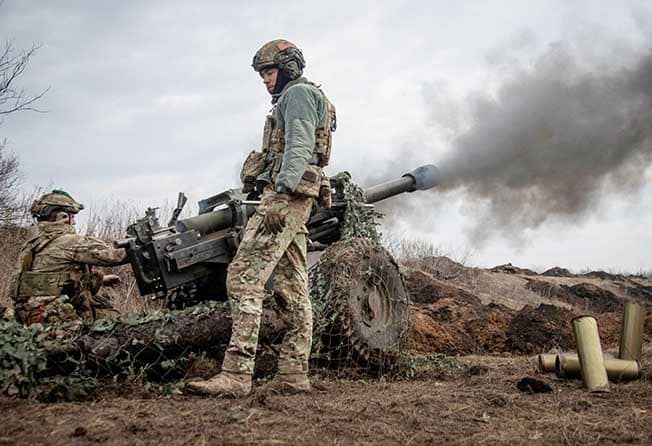Russian troops keep coming in waves along the frontline in eastern Ukraine, Ukrainian soldiers said on Tuesday, a sign of no letup in Russia’s winter offensive despite Moscow having failed to secure any big victories so far.
Russia and Ukraine are locked in the bloodiest infantry battle in Europe since World War Two, after Moscow launched a winter offensive with hundreds of thousands of freshly called up reservists and mercenaries. Frontlines have barely budged in more than four months despite huge losses on both sides.
With assaults elsewhere on the front having failed, Russia appears determined to secure the ruins of the small city of Bakhmut in what would be its first victory since mid-2022.
In an overnight video address, President Volodymyr Zelenskiy said Ukraine’s “future is being decided” in battles in the east, including Bakhmut, where Ukrainian commanders say they are killing enough Russian attackers to justify staying and fighting for a ruined city that has nearly been surrounded.
“It is very tough in the east – very painful,” Zelenskiy said. “We have to destroy the enemy’s military power. And we shall destroy it.”
Further north on the frontline near Kreminna, Oleksandr, 50, commander of a unit in Ukraine’s 110th battalion, said Russian assaults were still relentless despite having claimed little ground there. The Russians are trying to edge back towards Lyman, a major transit hub Ukraine recaptured last year.
“They are pushing hard. They are lobbing mortar bombs at us,” Oleksandr told Reuters, describing Russian units advancing in three-man fire teams, with another wave behind them sent to replace them when they are killed.
“At night they always attack on foot and we sit, looking through our thermal goggles, and shooting them.”
The Kremlin, for its part, said it was committed to using force to achieve its war aims, and Kyiv must accept “new realities” – its shorthand for Russia’s claim to have annexed nearly a fifth of Ukraine, which it invaded a year ago.
“We have to achieve our goals. Right now this is only possible by military means due to the current position of the Kyiv regime,” Russian state news agencies quoted Kremlin spokesman Dmitry Peskov as saying.
Russian President Vladimir Putin said on Tuesday that what was at stake in Ukraine was Russia’s very existence.
SHELL SHORTAGE
After recapturing swathes of territory in the second half of 2022, Kyiv has kept mainly to the defensive over the past four months, while Moscow has launched its big winter offensive using its freshly mobilised reservists and convicts recruited from jail as mercenaries.
Ukrainian officials say they are preparing their own counter-offensive for later this year, once muddy ground dries up and hundreds of Western tanks and armoured vehicles arrive.
But the outcome of those campaigns could depend on which side emerges stronger after Russia’s winter assault, with both sides taking huge casualties in fighting they describe as a meat grinder.
Britain’s Ministry of Defence said on Tuesday that Moscow was running short of ammunition, “to the extent that extremely punitive shell-rationing is in force on many parts of the front”.
“This has almost certainly been a key reason why no Russian formation has recently been able to generate operationally significant offensive action,” it said in a daily intelligence update.
But Ukraine is also facing shortages of shells, and ultimately has a smaller population to commit to a battle of attrition. Some military experts say Bakhmut is unfavourable ground for Kyiv to fight on, against Russian forces that have advanced far enough around the city to hit Ukrainian supply lines in the rear.
“We could lose here everything we wanted to use for those counter-offensives,” Ukrainian military analyst Oleh Zhdanov said of the battle for Bakhmut.
Both sides reported fresh civilian casualties near the front.
Zelenskiy said six high-rise buildings were hit in the centre of Kramatorsk by a Russian missile, killing at least one person and wounding three. On the Russian-occupied side, in Volnovakha further south, the body of a woman lay on a street next to a ruined shop. A Russian military investigator told Reuters the area was hit by Ukrainian shells.
Off the battlefield, negotiators hit a snag in talks to extend the Black Sea grain deal, brokered by the U.N. and Turkey to prevent global famine by securing wartime exports from Ukraine and Russia, both among the world’s top food suppliers.
The agreement expires this week. Russia said it had agreed to let it be extended for 60 days, in what the Kremlin called a gesture of “goodwill”, but would block any further extension unless it received more guarantees from the West for exports of its own fertiliser and crops.
Kyiv rejected the 60-day extension, saying the agreement allows extensions only of 120 days. It says a shorter duration would not be long enough to organise new grain shipments.







Click here to change your cookie preferences